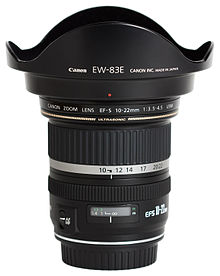Canon EF-S 10–22mm lens
 | |
| Maker | Canon |
|---|---|
| Technical data | |
| Type | Zoom |
| Focus drive | Ultrasonic motor |
| Focal length | 10–22mm |
| Focal length (35mm equiv.) | 16–35mm |
| Crop factor | 1.6 |
| Aperture (max/min) | f/3.5–4.5 / f/22–29 |
| Close focus distance | 0.24 m (0.79 ft) |
| Max. magnification | 0.17 @ 22mm |
| Diaphragm blades | 6 |
| Construction | 13 elements in 10 groups |
| Features | |
| Short back focus | |
| Lens-based stabilization | |
| Macro capable | |
| Application | Ultra-Wide Zoom |
| Physical | |
| Max. length | 89.8 mm (3.5 in) |
| Diameter | 83.5 mm (3.3 in) |
| Weight | 385g (13.6 oz) |
| Filter diameter | 77 mm |
| Accessories | |
| Lens hood | EW-83E, optional |
| Case | LP1319, included |
| Angle of view | |
| Horizontal | 97°10'–54°30' |
| Vertical | 74°10'–37°50' |
| Diagonal | 107°30'–63°30' |
| History | |
| Introduction | 2004 |
| Retail info | |
| MSRP | $650 USD |
The Canon EF-S 10–22mm f/3.5–4.5 USM lens is a wide to ultra-wide angle zoom lens for Canon digital single-lens reflex cameras with a Canon EF-S lens mount.[1] The field of view has a 35 mm equivalent focal length of 16–35mm, which is analogous to the EF 16–35mm f/2.8L on a full-frame camera. The 10–22mm is an internal focusing lens. Of the 13 elements, one is of Canon's Super Ultra-Low Dispersion glass and three are aspherical elements.
Reception
[edit]Praise
[edit]The 10–22 is considered to have good image quality (sharp and low distortion) and build. The optical construction is similar to L-series lenses, but it is not designated as L-series (as reflected in the build quality), which some have argued is for marketing reasons, as with the 17–55.[2]
- "This is an extremely sharp lens, at all three tested focal lengths."[3]
- "There is moderate barrel distortion at 10mm, a negligible amount at 15mm, and only a tiny amount of pincushion distortion at 22mm. Overall, exemplary performance in this measure."[3]
- "This lens is small, light and solidly built. Sometimes Canon's non-L series lenses can feel a bit cheap, but not this one. … there is little to fault about it with regard to either fit or finish."[3]
Criticism
[edit]Cost is the biggest criticism; until fairly recently, the 10–22 cost as much as many L-series lenses, but is only usable on APS-C cameras, and thus is questionable as a long-term investment.[3][4] Others think this less of a concern.[2]
Chromatic aberration is somewhat high at 10mm, and vignetting is measurable at 10mm and maximum aperture (0.85 EV units),[5] but not terribly noticeable in normal use.[2]
Use
[edit]Optimal aperture (for sharpness and to reduce vignetting) is f/5.6 to f/8; f/8 is particularly recommended at 22mm.[3][4][5]
Filters exacerbate vignetting, hence thin filters are recommended at 10mm, and stacking filters is discouraged.[2]
Similar lenses
[edit]In May 2014, Canon announced a less expensive alternative wide-angle zoom for APS-C bodies, the EF-S 10–18mm. The new lens, which is being sold alongside the 10–22, is slower than the 10–22 (maximum aperture range of f/4.5–5.6) and also lacks a USM motor, but adds both image stabilization and Canon's stepping motor technology. It is also smaller and lighter than the 10–22.[6]
Sigma offers two ultra-wide angle lenses for APS-C sensors—the 8–16 DC and 10–20 DC. Tamron also offers a 10–24mm ultra-wide zoom lens for APS-C cameras as well as an older 11–18mm lens.
In May 2008, "PhotoZone" considered the Tokina 11–16mm, f/2.8, introduced in 2008, to be the best ultra-wide angle lens available for Canon APS-C Format cameras.[7]
References
[edit]- ^ Canon Inc. "EF-S 10-22mm f/3.5-4.5 USM". Canon Camera Museum. Archived from the original on 11 June 2009. Retrieved 31 May 2007.
- ^ a b c d Atkins, Bob. "Canon EF-S 10-22/3.5-4.5 USM Lens Review". photo.net. Archived from the original on 21 July 2009. Retrieved 9 March 2008.
- ^ a b c d e "Canon EF-S 10–22mm f/3.5–4.5 USM". The Luminous Landscape. Archived from the original on 4 August 2009. Retrieved 9 March 2008.
- ^ a b Andrews, Ian. "Canon EF-S 10–22mm f/3.5–4.5 USM". photodo.
- ^ a b "Canon EF-S 10–22mm f/3.5–4.5 USM". SLRgear.com. Archived from the original on 7 September 2015. Retrieved 9 March 2008.
- ^ "Canon Broadens Its Imaging Lineup with Two New EF Ultra Wide-Angle Zoom Lenses and White EOS Rebel SL1 Digital SLR Camera" (Press release). Canon U.S.A., Inc. 13 May 2014. Retrieved 13 May 2014.
- ^ "Tokina AF 11–16mm f/2.8 AT-X Pro DX (Canon) – Review / Lens Test Report". photozone. Retrieved 15 July 2008.
External links
[edit]Specifications
[edit]- Press release on DPreview
- Canon Technical Specifications


 French
French Deutsch
Deutsch